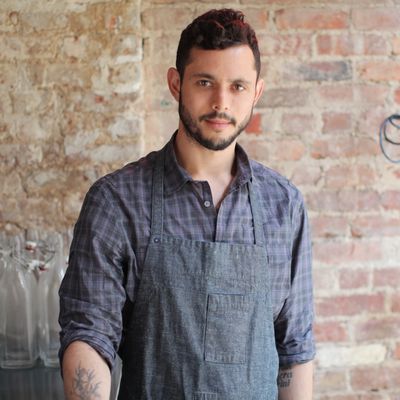
Yesterday, the U.S. District Court for California overturned the state’s ban on the sale and trade of foie gras. Chefs rejoiced: The rule had been in effect since 2012 — and if restaurants wanted to serve the contraband at all, they had to be discreet and creative. Alma chef Ari Taymor has actually been serving “duck liver” all along, in part as a statement against the ban, which he finds inane. We called him to discuss how the change will affect his restaurant and others, and what he thinks are all the real issues regarding food policy. Here’s what he had to say:
We didn’t start serving foie until the ban. About a week later, we found a farm that does non-gavage foie, so the ducks aren’t force-fed. It’s a humane farm, and we felt fine serving it. I feel like there are bigger problems to deal with in terms of animal cruelty, and this was a really ridiculous, hypocritical rule that did nothing for anybody.
We were calling it duck liver. But if anybody asked, or said that they did not eat foie, we would omit it. We never lied about it: If people asked if we used foie in the dish, we said yes.
It’s the one thing on the menu that doesn’t change — at least, it hasn’t since the start of the foie ban. I don’t necessarily love liver, or love foie, but I felt like it was such a ridiculous thing for the authorities to do. So, yeah, it was my personal little fuck-you. I wouldn’t have served it, I don’t think, if they didn’t ban it.
We could’ve been fined by the state, but I wasn’t too worried about getting caught. There was no real push-back about it. Still, I don’t think anyone in L.A. was serving it — at least to my knowledge. The people that were serving it were pretty high-profile, like the guys at Animal, so if they had continued to, they would’ve come under a lot of heat.
The law was banning a product that primarily is small-farmer-produced. There’s not a lot of commodity foie gras because of the amount of labor that goes into it. Most often, the ducks and geese are allowed to free-range — even if they are being gavaged, they get to free-range until that happens.
While foie was being banned, you could drive up the I-5 and see countless feedlots and factory farms where animals were being pumped with hormones, kept in inhumane conditions, and feeling maximum amounts of fear and distress — and this was not only legal, but subsidized by the government. Our tax money goes to subsidizing these types of farming operations. So the foie ban felt, to me, like the most disingenuous law: It supposedly prevented animal cruelty, but it was an absolute sham.
I was completely surprised that it got overturned. It’s how it should be. But for us, nothing will change now. We’re not going to do anything differently, but I guess we don’t have to worry about getting a lot of heat from — I don’t even know how they would do it. I guess someone would have to report you, and then they would come in. I have no idea even how they were trying to crack down on it. I didn’t hear about anyone getting fined. There were just some threats, and a lot of protests.
In every type of food environment — whether it’s vegetables or strawberries or whatever — there are always horrible producers doing horrible things. We just went about sourcing it the same way we go about sourcing everything: putting growing and living conditions for the animals first, and quality second. All of our meat is pastured. If we use beef, it’s primarily grass-fed.
The ban went after the wrong people. It’s sadly emblematic of where government is when it comes to food policy. Food safety is completely ass-backwards. They go after small farmers, when all the food-borne illnesses are coming from factories making peanut butter because there’s rat shit everywhere. It’s a pretty embarrassing state of affairs when it comes to both animal-safety measures and human-food safety measures. It’s pretty much a joke.




